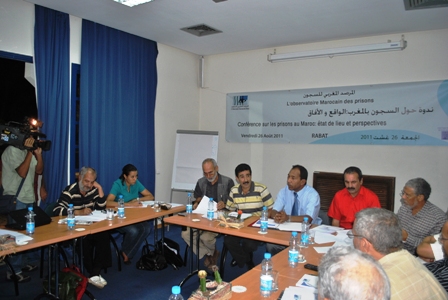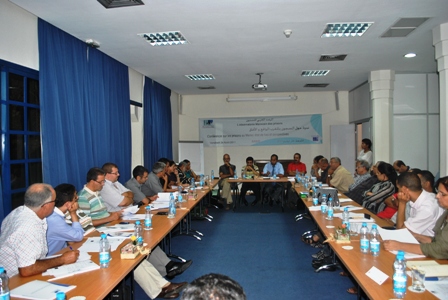CNDH SG CALLS FOR CORRECTION/INTEGRATION BASED PUNITIVE POLICY THAT RESPECTS HUMAN RIGHTS
CNDH SG Mr. Mohammed Essabbar called for the reconsideration of the Moroccan punitive policy and for the humanization of punishment through a correction and integration based policy.In a seminar on “Prisons in Morocco: reality and horizons”, Mr. Essabbar said that “the prevention of liberty does not prevent the inmate from his/her dignity and other basic human rights”. We need to stop considering prisoners as dangerous for society and have correction and integration prevail, he said.
This seminar was organized by the Moroccan Prison Observatory, supported by the EU Delegation, on August 26th, 2011.

CNDH SG highlighted the need to abide by the law in any prison disorder, caused by the inmates or the prison staff, and to avoid collective punishment. He called human rights groups to seek accuracy and objectivity and rely on accurate evidences when dealing with prison events. They should distance themselves from any claims and try to examine and investigate these claims to establish the truth, he said.
Mr. Essabbar shed light on the provisions of law # 23.98, related to prison institutions. He considered it as a real shift in the field of prisoners’ rights.
This law was issued in 1993. It was drafted upon a recommendation issued by the former Advisory Council on Human Rights (now National Human Rights Council-CNDH). It laid down several rights, including non-discrimination between prisoners, respect of prisoners’ human dignity, the right to present complaints, to appeal against disciplinary decisions, to participate in educational and creativity programs, the right to recreation and furlough etc. It guarantees the right to practice religion and have exceptional permits and parole. It creates a centre for juvenile delinquents and encourages the participation of civil society groups in educational and creativity programs.

However, Mr. Essabbar underlined some shortcomings:
- only a limited number of inmates are released on parole or benefited from exceptional permits;
- the space available for each inmate has been reduced due to the overcrowding of prisons;
- the number of recidivists increases;
- the delays within which appeals against disciplinary decisions are considered to be too long.
CNDH SG indicated that the National Human Rights Council drafted a report on prisons in 2004 and issued a number of recommendations, including the following:
- entitle the judge in charge of enforcing sentences to give an opinion on proposals for parole, and to adjudicate on disputes over disciplinary measures;
- reduce the time needed to adjudicate on such disputes;
- codify the system of conjugal visits;
- allow the placement of juvenile offenders directly in reform and rehabilitation centers;
- help inmates open up to their external environment;
- pay special attention to the elderly prisoners and those with special needs;
- integrate sentencing alternatives;
- include a doctor and a CNDH member into the Board of Pardon;
- have new occasions for the granting of collective pardons; etc.
Several contributions were scheduled in the abovementioned seminar. The participants shed light on reality in prisons from different perspectives and discussed several related points.






















